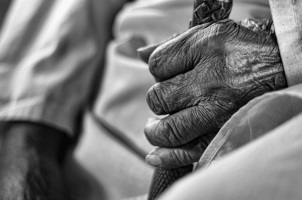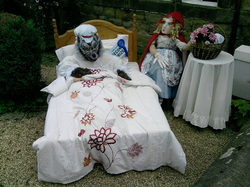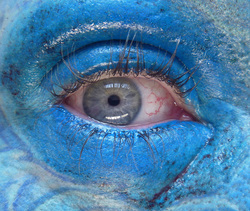
I hope you'll find the generosity to indulge me and perhaps return the favour in the comments box below. And, because it's the time of year for tantalising puzzles, there's a connection between the numbers marked with an asterisk.
| annethology |
|
I started this blog in 2013 to share my reflections on reading, writing and psychology, along with my journey to become a published novelist. I soon graduated to about twenty book reviews a month and a weekly 99-word story. Ten years later, I've transferred my writing / publication updates to my new website but will continue here with occasional reviews and flash fiction pieces, and maybe the odd personal post.
 So, it's the time of year when the newspapers, half the staff on holiday and the other half nursing hangovers, fob us off with reviews of the year which are nothing more than a rehash of the articles they can most easily lay their hands on, much in the way a cook conjures up a curry from the leftover turkey. Now, I've got more respect for my readers, yet – blame the sherry and figgy pudding, if not the reruns of sentimental Hollywood films – I feel a similar urge to regale you with a look back at my reading and writing and blogging year. I hope you'll find the generosity to indulge me and perhaps return the favour in the comments box below. And, because it's the time of year for tantalising puzzles, there's a connection between the numbers marked with an asterisk.
2 Comments
 Back in the summer, I had occasion to take the bus – not something I do very often and I’m acutely aware of my limitations in that regard. (How assertively do I stick my arm out for the bus to stop? Do I have to have the right change? Why don’t the passengers have seat belts?) This time, the bus stopped at my request and I paid my fare without incident, then looked down the aisle for somewhere to sit. It was rush hour and all I could see were pairs of commuters locked into their own worlds of music or text messaging on their phones. As I was resigning myself to having to stand for the next half-hour, swaying with each turn of the wheel, a boy stood up to offer me his seat. At more or less the same time, I spotted a vacancy towards the back, so I thanked the boy and made my way towards it. I was surprised by the young man’s offer, and somewhat amused, wondering what had evoked it. Did he see me as old and doddery? Okay, I’m past fifty, but hopefully I’ve got a few more years in me yet. I might have grey hair but, in a certain light if I’m wearing a hat (which, admittedly I wasn’t), I look like a teenaged boy, only without the pimples. Yet I wasn’t offended. I don’t mind being an unflattering stereotype if it elicits acts of generosity and politeness. I was reminded of this incident on reading a lovely article by Penelope Lively on turning eighty. Amid the aches and pains and indignities, she finds plenty of consolation: 
What’s left of the Christmas narrative once you’ve given up on Santa and the divinity of the Baby Jesus, when you don’t eat turkey and there’s no magic left in buying gifts for friends and family already drowning in possessions? Well, quite a lot as it happens because, stripped of the tackiness and tinsel, Christmas is a celebration of our interdependence and connectedness. So (especially after the previous post about the need for writers to shrug off our parents) I couldn’t let the occasion go by without posting my virtual Christmas card and thanking readers old and new for your support of the blog over its fledging year.
Of course, relationships are at the heart of fiction – at least the kind I like – all year round. Having spent the last few days arranging my published short stories into themed categories (obviously avoiding more pressing tasks), I’m struck by how many are about family, parent-child and couple relationships. And many of those I didn’t list under those headings still touch on how we rub along together, for better or worse. My favourite Christmas stories have a hint of the supernatural, although their morality is firmly grounded in the harsh realities of the societies we humans have created for ourselves. The movie (originally a short story), It’s a Wonderful Life, where a guardian angel convinces a suicidal James Stewart his life has been a force for good, still brings a tear to my eye. It’s a kind of reverse A Christmas Carol, where it’s the visions of his coldness, greed and loneliness that persuade Scrooge that human relationships are worth more to him than his mountains of money. If the Christmas narrative oozes redemption and inherent goodness, where do the cynics get their seasonal kicks? Who writes for those who don’t believe in happy endings, whose families are dysfunctional beyond repair? My favourite anti-Christmas story is Jonathan Franzen’s The Corrections, the antidote to the schmaltzy home-for-Christmas movie. Determined to gather her adult children around her for ‘one last Christmas’, Enid is unaware how distant her version of the cosy family is from theirs. Christmas hasn’t served as much of an inspiration for my own writing, although I do have a holiday-hideaway scene in my work-in-progress novel Underneath, and I’ve found it useful in longer works as a marker of the passage of time. I’m also quite chuffed, in a business-as-usual way, that one of my short stories, The Seven Dudley Sibs, is actually published on Christmas day. Of the two seasonal stories I have published, I’ve got one for those who go for feel-good and one for the bah-humbugs: in The Front Legs of the Pantomime Horse, Jo finds the local pantomime a lot more rewarding than she expected; in The Wilsons Go Shopping, an ordinary supermarket shop reminds the family how much they’ve lost.
How does Christmas impact on your own writing? Which type of Christmas narrative do you prefer? And, whatever your take on Christmas, hope yours is everything you'd like it to be.
 Have you ever stamped on a good idea, told yourself I can’t write that, what will people think? It’s hard enough being a writer without censoring your thoughts before you can even get them down on the page or screen, and your prose is likely to suffer when you’re busy trying not to offend the judge that sits in your head. But shaking off these inhibitions isn’t always easy, especially when they stem from our childhood notions of what’s right and wrong. That’s why I love this quote from Paul Theroux via Thought Catalog: Notice how many of the Olympic athletes effusively thanked their mothers for their success? “She drove me to my practice at four in the morning,” etc. Writing is not figure skating or skiing. Your mother will not make you a writer. My advice to any young person who wants to write is: leave home. Similarly, in an interview with Lisa Allardice for the Guardian Review, Alice Munro, the new Nobel laureate said: [W]hen you are growing up you have to pull apart from what your mother wants or needs, you’ve got to go your own way  Taking down one’s Athena posters or whatever’s the current equivalent and moving into a grotty flat with half a dozen friends is only the first stage of leaving home; psychological separation from our parents can be much trickier, and some don’t ever achieve it. How do writers break free of parental commandments to write as ourselves? Greg tells me Lorrie Moore told students to write to shock their parents and Emma Darwin sometimes recommends writers (see comments) imagine their parents are dead. The metaphorical death of our parents is so essential to growing up it’s the stuff of myth and fairytales. The failure to separate can produce some interesting writing, too. So what’s all this got to do with my newly published story, Had to Be You? To say much more would spoil it; why not have a read and let me know what you think?  So, the veteran broadcaster David Dimbleby has gone and got himself a tattoo, apparently something he’s always wanted. Well, I can think of nobler ambitions, but each to his own. It’s not for me to judge another’s personal choices. Yet, with my psychology background – dammit, as me – I can’t help feeling alarmed at the normalisation of cosmetic surgery, of which inking one’s epidermidis is surely the mildest manifestation: hippie dope to today’s crack cocaine. I’m naturally suspicious of transformations on the outside deemed to make people happier on the inside, but I have to admit, it works for some. My scepticism is mirrored in Susie Nott-Bower’s debut novel, The Making of Her. Like all good fiction, it tackles the issue of modern metamorphosis from multiple perspectives, never coming down on one dogmatic position but leaving the reader to make up her own mind. Definitely my kind of book, so I was delighted to get the chance to ask Susie more about this via an annethology author interview.
Another novel featuring troublesome bodies is Lionel Shriver’s So Much for That. There’s illness, disability and, SLIGHT SPOILER ALERT HERE, the gruesome impact of botched cosmetic surgery, but the real transformation comes from a character’s determination to follow his somewhat unrealistic dream. I’ve had a long-standing interest in exploring our relationship with our bodies in my own fiction, from the girl who’s always longed to look like everybody else to the woman who wakes up on the morning of her wedding to find her neck has grown as long as her arm to the sister whose determination to decide the shape of her own body causes consternation to those around her. The idea behind How’s Your Sister? came from wondering whether there should be any limits to an individual’s custody over her own body. Should we be able to commission cosmetic surgery to order in the way we can employ a carpenter to construct a custom-made cupboard to fit into an awkward corner of our home? When I was a child, tattoos were for merchant seamen, but these are more liberal times. Botox, a nose job or new boobs – the province of narcissistic celebrities as little as ten years ago are heading towards the requirement for a groomed woman as much as a decent haircut and the correctly coloured lips. Nobody forced me, she says. I’m doing it for me. But what if she wants something more extreme: dainty feet only possible through foot binding á la 19th-century China; amputated genitals á la too many places around the world. Think she’d only want what’s good for her – how about those who starve themselves in the midst of plenty? We mobilise the psychiatric system to rescue the anorexic from herself (albeit not always very successfully, or even sympathetically, but that’s another story). We question the motives underlying her desire for a super-thin body. Society has drawn a line here about what she can and cannot choose. The consensus of what’s deemed healthy and acceptable evolves over time. I’ll be watching the shifting boundaries of cosmetic surgery with interest. But I’ll live it only through my fiction, thank you very much. I wouldn’t even subject myself to the tiniest tattoo. How about you?  The first person plural point of view is relatively uncommon in fiction, so hurrah for Chuffed Buff Books for inviting submissions with a group narrator for their latest short story anthology. But does it work? Well, as I’m one of the five ‘bits of we’ in the collection I must think so, but not everyone may agree. I wrote A House for the Wazungu from the perspective of the inhabitants of a close-knit community asked to host visitors from abroad. Although a couple of villagers are identified by name – the schoolmaster, Albert Lumumba, and Miriam Moto, the owner of the chai stall – I wanted to conjure a place where individual identities are subsumed within the collective, a culture that values interdependence, as in rural communities of the Global South. The inhabitants of my fictional Kanini would be too busy surviving to concern themselves with such indulgences as communing with their true selves. A novel written exclusively in the first person plural is The Virgin Suicides by Jeffrey Eugenides. Here the narrators are a group of men who, as teenagers, were obsessed with the Lisbon sisters, all of whom committed suicide. Although several of the boys are mentioned by name, it’s never clear who is speaking, so that the narrative unfolds as if chanted by a Greek chorus. Given that adolescents, despite the undoubted self-obsession, are strongly under the sway of peer-group norms, this is the ideal form for this particular novel. Similarly, I used the first person plural in my short story, Kinky Norm, about a bunch of teenage girls rounding on a teacher. Although it starts with an adult ‘I’ looking back on her childhood, she soon takes refuge in the group ‘we’ where no individual is responsible for what occurs: We didn’t sit down together and discuss what we were going to do. There was no plan. No ringleader. It just happened: one of those spontaneous eruptions of adolescent exuberance that our schoolmaster had dedicated his career to nurturing. |
entertaining fiction about identity, mental health and social justice
Annecdotal is where real life brushes up against the fictional.
Annecdotist is the blogging persona of Anne Goodwin:
reader, writer, slug-slayer, tramper of moors, recovering psychologist, struggling soprano, author of three fiction books. LATEST POSTS HERE
I don't post to a schedule, but average around ten reviews a month (see here for an alphabetical list), some linked to a weekly flash fiction, plus posts on my WIPs and published books. Your comments are welcome any time any where. Get new posts direct to your inbox ...
or click here …
Popular posts
Categories/Tags
All
Archives
March 2024
BLOGGING COMMUNITIES
|